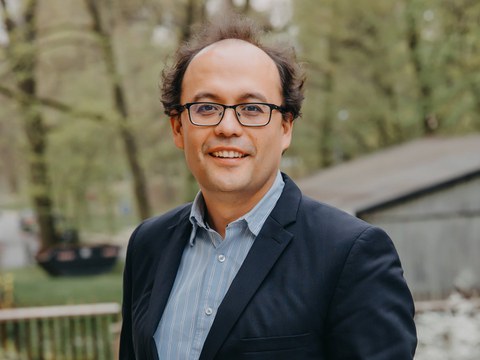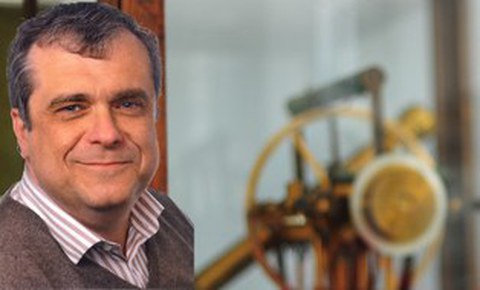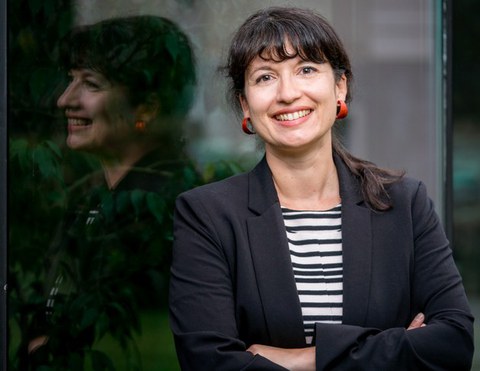Colloquium on the HPC system inauguration 2024
April 23, 2024, 4:00 pm - 5:30 pm, Andreas-Pfitzmann-Bau
The scientific colloquium on the occasion of our HPC cluster inauguration gives scientists whose research is enabled or promoted by the use of high-performance computing.
How supercomputers are helping us with the energy transition
Prof. Dr. Thomas D. Kühne, Centre for Advanced Systems Understanding - CASUS, Görlitz
Designing systems based on environmentally friendly materials is essential to creating a greener economic system. Making incremental improvements in materials development won't be enough. Rather, an active exploration of new materials has to start. In this regard, data-driven materials design can accelerate the development of novel materials. High-performance computers or supercomputers and the clever use of these with the help of new algorithms and better hardware-software architectures are immensely important tools in this respect.
CASUS researchers focus on topological materials (TM) because of their unique electronic structure. TMs are potential candidates for applications in microelectronic components, catalysis, thermoelectrics, and new magnetic storage media, among others.
The CASUS team has successfully used virtual materials screening to identify TMs that could be used as photocatalysts - and scrutinizes these materials together with experimental scientists. Photocatalytic water splitting is inspired by natural photosynthesis - dissociating water into oxygen and hydrogen, a much needed green energy source. However, several limitations hamper the translation into viable economic products. CASUS research is addressing these limitations in this technology - and others. In the era of big data, with ever-growing free-access databases, state-of-the-art machine learning techniques can provide valuable insights which is beyond human reach. Such techniques are a leap in predicting the structure and the structure-property relationship of materials. At CASUS, machine learning and supercomputers are used to design novel materials for future devices and technologies.
Thomas D. Kühne studied computer science and computational science at ETH Zurich and received his doctorate in theoretical physics in 2008. He then worked for a year as a postdoctoral researcher at Harvard University. His research to date has focused primarily on the investigation of complex systems in condensed phases using computational methods, in particular aqueous systems such as water interfaces or biologically relevant reactions in water solutions. From 2010, Thomas D. Kühne was Junior Professor of Theoretical Chemistry at Johannes Gutenberg University Mainz until he took up the Chair of Theoretical Interfacial Chemistry at Paderborn University in 2014. Thomas D. Kühne has held the Chair of Theoretical Chemistry there since September 2018.
Astrometry with Gaia: Deciphering the cosmic dance
Prof. Dr. Sergei A. Klioner, Lohrmann Observatory and Institute for Planetary Geodesy, TU Dresden
Gaia is a special astrometric space telescope of the European Space Agency ESA, which was launched in 2013. Gaia measures 3-dimensional positions and 3-dimensional velocities of approximately two billion stars, galaxies, quasars and solar system objects. Gaia's results are considered a scientific revolution in astronomy and have been used in approximately 10,000 peer-reviewed publications to date. Gaia's data processing represents one of the largest computations in the history of astronomy. The use of HPC facilities at TU Dresden has contributed significantly to the success of the project.
Sergei A. Klioner studied astronomy and celestial mechanics after receiving his doctorate in this field in 1991. His main research interests are space astrometry, celestial mechanics, general relativity and metric theories of gravitation as well as computer algebra. In 2004 he took up a position as Privatdozent (PD) at the TUD Dresden University of Technology. Prof. Dr. Sergei A. Klioner has been working for the ESA Gaia space project since 2000 and has been a member of the project's Scientific Advisory Board since 2007.
Beyond the Scalpel: Revolutionizing Surgery with AI and Robotics
Prof.in Dr. Stefanie Speidel, National Center for Tumor Diseases Dresden, TU Dresden
Advanced surgical technologies, like preoperative imaging, digital ORs and robotics, generate vast data for enhancing patient care. However, leveraging this data efficiently during surgery, a complex and time-sensitive process, remains heavily reliant on surgical staff experience. This talk focuses on AI-assisted surgery with a specific focus on analysis of intraoperative video data. The goal is to democratize surgical skills and enhance the collaboration between surgeons and cyber-physical systems by quantifying surgical experience and make it accessible to machines. Several examples to optimize the therapy of the individual patient along the surgical treatment path are given. Finally, remaining challenges and strategies to overcome them are discussed.
Stefanie Speidel studied at the University of Karlsruhe (TU) and the Royal Institute of Technology Stockholm (Sweden). She conducted postdoctoral research at the University of Heidelberg and has headed her own junior research group, "Computer-assisted Surgery", at the Karlsruhe Institute of Technology (KIT) since 2012. Stefanie Speidel has already received a number of scientific awards, including the Technology Award of the European Association for Endoscopic Surgery (2007), the Maria Gräfin von Linden Prize (2011) and a Margarete von Wrangell Fellowship (2011). She has also received two awards for outstanding teaching. Prof. Stefanie Speidel has been Professor of Translational Surgical Oncology at the National Center for Tumor Diseases Dresden (NCT/UCC) since 2017. Her research interests include intelligent assistance systems for the operating theater.



